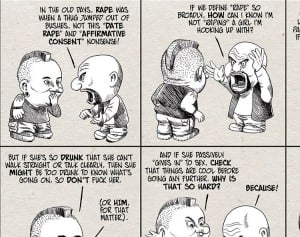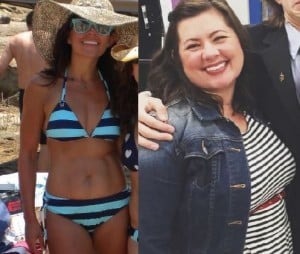
A couple shares a hymnal book during Mass.
Originally published on xoJane and republished here with their permission.
(Content Warning: emotional abuse)
My first memories of church are of acceptance. My parents are Christians, the love-for-everyone, turn-the-other-cheek kind. They taught me to never judge anyone for believing differently, and to be kind as much as I could.
The Methodist church we attended had a lady pastor, so, pretty progressive for the early 90s. She preached about love and forgiveness for ourselves, and for others. We sang all the classic hymns. I loved hearing my mom and dad sing together.
Going to church back then made me feel warm and cozy, loved both by God and my family. If there was ever any talk about sin, duty, or damnation, I don’t remember it. Childhood is funny that way, though.
My ex and his family were Christians, too. At first, I thought that meant that we had common ground. When I told my mom about his family, I told her that they were like us – a close-knit Christian family that loved each other.
Just recently, she told me how shocked she was when they finally met. She couldn’t believe they were the same people I’d compared our family to. I wish she’d said something about that disconnect to me then… as does she.
Due in part to how I was raised, I have a tendency to project good qualities onto others. I give people the benefit of the doubt, and assume the best. For the most part, I still do this, and I’m OK with being a little naive.
Thanks to my ex’s family, though, I now know to wait for people to show me their values, because what they say is often miles away from how they live.
My ex’s family was dysfunctional, and that’s my kindest description. His father was cruel and openly resentful of his children. When angry, he reminded them how much he had sacrificed to give them a “good” life.
His mother was close-minded, manipulative and greedy. She never worked outside the home, married an older man, and had children right out of high school. Her world was very small, and her examples of marriage were sadly limited. She took control by micro-managing the family’s finances, and judging the hell out of anyone who didn’t live life “the right way” – their way.
My ex’s father treated his wife with contempt, mocking her for saying stupid things and being uneducated. She responded by lashing out, most often at her children.
Laying all this out, you would think that the family would be aware of their issues, but they didn’t see it that way. I didn’t either, at least not at first. I was a sheltered kid. I believed what they told me about themselves, rather than how I saw them living.
They honestly believed they were the ultimate Good Christian Family. They checked all the right boxes: Strong father provides, mother stays home. A homemade sit-down dinner together every night (never mind that the meal was silent and loaded with tension).
They blamed their children’s issues on the “outside world” corrupting their perfectly-reared boys. Self-righteousness clouded their perception.
Most importantly of all: They’d been married for 20 years. His mother told me once that she was so relieved when she found out my parents weren’t divorced, because then they would never have allowed their son to date me.
I laughed, because I initially thought she was joking. I thought they liked me for who I was, but really, they only approved because I had the “right” background.
As is required to be a “perfect Christian family,” they attended church every single Sunday. No one in our small community knew about any of their problems, and as far as I know, they still don’t. Everything was shiny on the outside.
My ex was basically a kid when we married. He was sweeter, more flexible. I saw a spark in him that defied his upbringing… at least for the first few years. I did love him then, despite his stressful family.
I wanted them to like me, so I accepted the expectations of a good Christian wife. I began attending church with them. I would sit beside my husband, in my modest-but-attractive Church Clothes, and listen to the Truth as told by Southern Baptists. We would never talk about the sermons afterward.
So many of the messages were about relationships: staying pure, sticking by your man when he struggles, supporting his goals, not leading him to sin.
The man was always, always, the unquestioned leader of the house.
Aside from that – what amounted to wife training – the other sermons mostly focused on the heinous sins we all were committing. Every week we learned a new way we were personally affronting Jesus.
It was a different message than my childhood church, but wrapped up in the same language. I took away that message that love is supposed to be hard, and if it doesn’t work, it’s your fault.
I wasn’t brainwashed; I still made my own decisions. But it is more difficult to argue when so many around you refuse to question the “ultimate authority.”
In the early days of our relationship, prior to the abuse, any concerns that I had were scripture-quoted away by well-meaning Christian counselors and friends. I internalized the lessons, learned to silence my doubts, and stopped asking questions.
By now we all know the story: Time passed, my ex pushed boundaries, isolated me, and eventually began to verbally and physically abuse me.
As his wife, according to the church, I was responsible for making sure he was successful and stayed out of trouble. Each time I failed to support him, I failed as a wife.
He told me I should be grateful that he would be willing to stay with such a disgraceful woman. He expected me to fall apart with gratitude when he generously “forgave” me.
The abuse to him was simply strong leadership. He was “hard on me” because he expected the best from me. Even though he frequently did and requested morally questionable things, he was beyond reproach. As head of our household, challenging him was disrespectful at least, and a violation of our vows at worst.
I wrestled with guilt and shame for years, trying to figure out what I was doing wrong to make my husband treat me so terribly. If only I could be a godlier wife, if only I was a better servant, my marriage would be a good one.
I could be happy. He would respect me, if only I could be everything he needed me to be. I was nowhere near perfect, and I hated myself for that.
It took three years of dating and five years of marriage for me to realize that my best would never be good enough for him, and I no longer had the energy to try.
I just got tired. It is exhausting to feel like you need to convince someone, day after day, that you’re worth something.
Of course, his family blamed me for the failure of our marriage. Despite all the evidence of the horrible things he had done, they believed I could have made him better if I had tried harder to be a godly wife. They told me I was disappointing God.
Now, when I see things like this, I can’t help but cringe. The messages are the same as I recall them, and they bring back all the guilt and shame that I felt. It reminds me of how trapped I thought I was.
In a respectful, healthy relationship, advice like this may work. I don’t fault anyone who has been helped by these things. I do question the idea that love is supposed to be such hard work. It seems so backward, and so damaging.
If you have real, unconditional love, it should mean just that: You don’t have to constantly prove that you deserve it. Ultimately, what gave me the peace I needed to leave my marriage was letting go of all of those expectations of perfection.
Now, it seems obvious to me how much of the church’s rhetoric is geared toward control, and how much it discourages women from speaking out about abuse.
The ideas I once saw as unchallengeable look more and more disturbing, the further away I get from my ex and his family. I know I’m not alone. Reading the stories of other women trapped in religious isolation helped me realize just how dangerous this kind of thinking can truly be.
When I think about going back to church, even four years later, my heart beats faster and my chest feels tight. I don’t know if I can ever get back to how I felt about it before I met my ex. Honestly, I don’t know if it’s something I want to get back to.
I’ve found other ways to connect to the universe. I’ve discovered I don’t mind having questions that can’t be easily answered.
The world is more complex, more strange, and more beautiful than I will understand in this lifetime.
When love is real, and unconditional, it can heal all kinds of hurt. These things give me hope for something bigger, for something that binds us all together. For now, that is enough for me.
Church used to be a feeling – a feeling of coming home, of being safe, loved and accepted. I’m afraid that my ex ruined that for me, but I am grateful that I am free.
I am okay with wandering, now that I have the opportunity to find my own way.
[do_widget id=’text-101′]
Elizabeth Webb is a wannabe storyteller with a degree in Geophysics who just quit my “real job” to move to Mexico and make pizza – so that should tell you how much she values smart choices. Her favorite things are: pizza (obviously), candles, talking to herself, being amazed by the circus of life like a total goober, and emotional science fiction/horror. She is interested in almost everything. You can read her articles here.

Search our 3000+ articles!
Read our articles about:
Our online racial justice training
Used by hundreds of universities, non-profits, and businesses.
Click to learn more




















